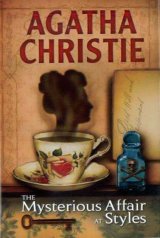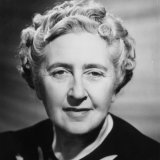The Mysterious Affair at Styles Page #7
The Mysterious Affair at Styles is a detective novel by British writer Agatha Christie. It was written in the middle of the First World War, in 1916, and first published by John Lane in the United States in October 1920 and in the United Kingdom by The Bodley Head on 21 January 1921.
“Poor Cynthia is quite frightened,” said Mrs. Cavendish in a low clear voice. She herself, I noticed, was dressed in her white land smock. Then it must be later than I thought. I saw that a faint streak of daylight was showing through the curtains of the windows, and that the clock on the mantelpiece pointed to close upon five o’clock. A strangled cry from the bed startled me. A fresh access of pain seized the unfortunate old lady. The convulsions were of a violence terrible to behold. Everything was confusion. We thronged round her, powerless to help or alleviate. A final convulsion lifted her from the bed, until she appeared to rest upon her head and her heels, with her body arched in an extraordinary manner. In vain Mary and John tried to administer more brandy. The moments flew. Again the body arched itself in that peculiar fashion. At that moment, Dr. Bauerstein pushed his way authoritatively into the room. For one instant he stopped dead, staring at the figure on the bed, and, at the same instant, Mrs. Inglethorp cried out in a strangled voice, her eyes fixed on the doctor: “Alfred—Alfred——” Then she fell back motionless on the pillows. With a stride, the doctor reached the bed, and seizing her arms worked them energetically, applying what I knew to be artificial respiration. He issued a few short sharp orders to the servants. An imperious wave of his hand drove us all to the door. We watched him, fascinated, though I think we all knew in our hearts that it was too late, and that nothing could be done now. I could see by the expression on his face that he himself had little hope. Finally he abandoned his task, shaking his head gravely. At that moment, we heard footsteps outside, and Dr. Wilkins, Mrs. Inglethorp’s own doctor, a portly, fussy little man, came bustling in. In a few words Dr. Bauerstein explained how he had happened to be passing the lodge gates as the car came out, and had run up to the house as fast as he could, whilst the car went on to fetch Dr. Wilkins. With a faint gesture of the hand, he indicated the figure on the bed. “Ve—ry sad. Ve—ry sad,” murmured Dr. Wilkins. “Poor dear lady. Always did far too much—far too much—against my advice. I warned her. Her heart was far from strong. ‘Take it easy,’ I said to her, ‘Take—it—easy’. But no—her zeal for good works was too great. Nature rebelled. Na—ture—re—belled.” Dr. Bauerstein, I noticed, was watching the local doctor narrowly. He still kept his eyes fixed on him as he spoke. “The convulsions were of a peculiar violence, Dr. Wilkins. I am sorry you were not here in time to witness them. They were quite—tetanic in character.” “Ah!” said Dr. Wilkins wisely. “I should like to speak to you in private,” said Dr. Bauerstein. He turned to John. “You do not object?” “Certainly not.” We all trooped out into the corridor, leaving the two doctors alone, and I heard the key turned in the lock behind us. We went slowly down the stairs. I was violently excited. I have a certain talent for deduction, and Dr. Bauerstein’s manner had started a flock of wild surmises in my mind. Mary Cavendish laid her hand upon my arm. “What is it? Why did Dr. Bauerstein seem so—peculiar?” I looked at her. “Do you know what I think?” “What?” “Listen!” I looked round, the others were out of earshot. I lowered my voice to a whisper. “I believe she has been poisoned! I’m certain Dr. Bauerstein suspects it.” “What?” She shrank against the wall, the pupils of her eyes dilating wildly. Then, with a sudden cry that startled me, she cried out: “No, no—not that—not that!” And breaking from me, fled up the stairs. I followed her, afraid that she was going to faint. I found her leaning against the bannisters, deadly pale. She waved me away impatiently. “No, no—leave me. I’d rather be alone. Let me just be quiet for a minute or two. Go down to the others.” I obeyed her reluctantly. John and Lawrence were in the dining-room. I joined them. We were all silent, but I suppose I voiced the thoughts of us all when I at last broke it by saying: “Where is Mr. Inglethorp?” John shook his head. “He’s not in the house.” Our eyes met. Where was Alfred Inglethorp? His absence was strange and inexplicable. I remembered Mrs. Inglethorp’s dying words. What lay beneath them? What more could she have told us, if she had had time? At last we heard the doctors descending the stairs. Dr. Wilkins was looking important and excited, and trying to conceal an inward exultation under a manner of decorous calm. Dr. Bauerstein remained in the background, his grave bearded face unchanged. Dr. Wilkins was the spokesman for the two. He addressed himself to John: “Mr. Cavendish, I should like your consent to a post-mortem.” “Is that necessary?” asked John gravely. A spasm of pain crossed his face. “Absolutely,” said Dr. Bauerstein. “You mean by that——?” “That neither Dr. Wilkins nor myself could give a death certificate under the circumstances.” John bent his head. “In that case, I have no alternative but to agree.” “Thank you,” said Dr. Wilkins briskly. “We propose that it should take place to-morrow night—or rather to-night.” And he glanced at the daylight. “Under the circumstances, I am afraid an inquest can hardly be avoided—these formalities are necessary, but I beg that you won’t distress yourselves.” There was a pause, and then Dr. Bauerstein drew two keys from his pocket, and handed them to John. “These are the keys of the two rooms. I have locked them and, in my opinion, they would be better kept locked for the present.” The doctors then departed. I had been turning over an idea in my head, and I felt that the moment had now come to broach it. Yet I was a little chary of doing so. John, I knew, had a horror of any kind of publicity, and was an easygoing optimist, who preferred never to meet trouble half-way. It might be difficult to convince him of the soundness of my plan. Lawrence, on the other hand, being less conventional, and having more imagination, I felt I might count upon as an ally. There was no doubt that the moment had come for me to take the lead. “John,” I said, “I am going to ask you something.” “Well?” “You remember my speaking of my friend Poirot? The Belgian who is here? He has been a most famous detective.” “Yes.” “I want you to let me call him in—to investigate this matter.” “What—now? Before the post-mortem?” “Yes, time is an advantage if—if—there has been foul play.” “Rubbish!” cried Lawrence angrily. “In my opinion the whole thing is a mare’s nest of Bauerstein’s! Wilkins hadn’t an idea of such a thing, until Bauerstein put it into his head. But, like all specialists, Bauerstein’s got a bee in his bonnet. Poisons are his hobby, so of course he sees them everywhere.”
Translation
Translate and read this book in other languages:
Select another language:
- - Select -
- 简体中文 (Chinese - Simplified)
- 繁體中文 (Chinese - Traditional)
- Español (Spanish)
- Esperanto (Esperanto)
- 日本語 (Japanese)
- Português (Portuguese)
- Deutsch (German)
- العربية (Arabic)
- Français (French)
- Русский (Russian)
- ಕನ್ನಡ (Kannada)
- 한국어 (Korean)
- עברית (Hebrew)
- Gaeilge (Irish)
- Українська (Ukrainian)
- اردو (Urdu)
- Magyar (Hungarian)
- मानक हिन्दी (Hindi)
- Indonesia (Indonesian)
- Italiano (Italian)
- தமிழ் (Tamil)
- Türkçe (Turkish)
- తెలుగు (Telugu)
- ภาษาไทย (Thai)
- Tiếng Việt (Vietnamese)
- Čeština (Czech)
- Polski (Polish)
- Bahasa Indonesia (Indonesian)
- Românește (Romanian)
- Nederlands (Dutch)
- Ελληνικά (Greek)
- Latinum (Latin)
- Svenska (Swedish)
- Dansk (Danish)
- Suomi (Finnish)
- فارسی (Persian)
- ייִדיש (Yiddish)
- հայերեն (Armenian)
- Norsk (Norwegian)
- English (English)
Citation
Use the citation below to add this book to your bibliography:
Style:MLAChicagoAPA
"The Mysterious Affair at Styles Books." Literature.com. STANDS4 LLC, 2025. Web. 31 Jan. 2025. <https://www.literature.com/book/the_mysterious_affair_at_styles_309>.








Discuss this The Mysterious Affair at Styles book with the community:
Report Comment
We're doing our best to make sure our content is useful, accurate and safe.
If by any chance you spot an inappropriate comment while navigating through our website please use this form to let us know, and we'll take care of it shortly.
Attachment
You need to be logged in to favorite.
Log In